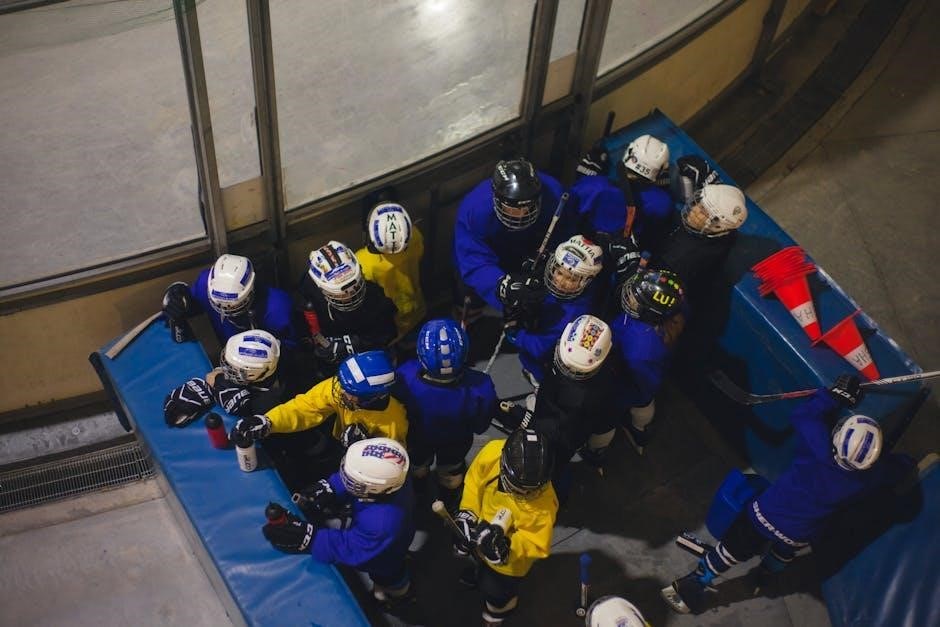Mental toughness is the ability to overcome obstacles, adapt to challenges, and maintain focus under pressure. It combines resilience, focus, and emotional stability, enabling young athletes to perform optimally and thrive in both sports and life, fostering personal growth and long-term success.
Definition of Mental Toughness
Mental toughness is a collection of psychological traits that enable individuals to perform optimally under pressure, overcome obstacles, and maintain focus in challenging situations. It is characterized by resilience, emotional stability, confidence, and adaptability. Unlike common misconceptions, mental toughness is not about being the loudest or most aggressive but rather about discipline, focus, and the ability to push through adversity. For young athletes, it involves training early, performing at limits when behind, and staying focused against tougher competitors. Mental toughness is not innate but can be cultivated through practice, experience, and guidance. It allows athletes to navigate setbacks like injuries or losses while remaining composed and motivated. This trait is dynamic, evolving through consistent effort and support, making it a cornerstone for success in both sports and life.
Misconceptions About Mental Toughness
Many misconceptions surround mental toughness, often leading to misunderstandings about its true nature. One common myth is that mental toughness is about being the loudest or most aggressive athlete, but it is actually rooted in discipline, focus, and resilience. Another misconception is that mentally tough individuals are immune to pressure or setbacks. In reality, mental toughness is about how effectively one navigates and recovers from adversity. Some believe it is an innate trait, but research shows it can be developed through practice, guidance, and experience. Additionally, mental toughness is not about suppressing emotions but rather managing them to maintain stability under pressure. It is also mistakenly viewed as a singular trait when, in fact, it encompasses a range of qualities like confidence, adaptability, and emotional control. Understanding these misconceptions helps clarify that mental toughness is a dynamic and trainable skill, not an unattainable or rigid personality trait.

The Importance of Mental Toughness
Mental toughness is crucial for young athletes, enabling them to overcome obstacles, adapt to challenges, and maintain focus under pressure. It fosters resilience, confidence, and emotional stability, essential for optimal performance and personal growth in sports and life.

Teaching Life Skills Through Mental Toughness
Mental toughness equips young athletes with essential life skills, such as resilience, confidence, and emotional control. These traits enable them to navigate challenges both on and off the field. By fostering a growth mindset, mental toughness helps athletes embrace setbacks as opportunities for growth rather than obstacles.
Goal-setting and reflection are key tools for developing mental toughness. Athletes learn to break down challenges into manageable steps, fostering perseverance and self-discipline. This process builds intrinsic motivation, driving them to push through discomfort and pursue long-term goals despite obstacles.
Coaches and parents play a vital role in integrating mental toughness training into daily routines. By emphasizing effort and progress, they help young athletes develop the mental strength needed for life’s challenges. These skills extend beyond sports, preparing athletes to thrive in academic, professional, and personal environments;
Ultimately, mental toughness empowers young athletes to manage stress, recover from disappointments, and stay committed to their goals. It transforms potential into tangible results, helping them achieve success in both sports and life.
Impact on Athletic Performance
Mental toughness significantly enhances a young athlete’s ability to perform at their highest potential. It fosters resilience, enabling them to overcome setbacks like injuries or losses while maintaining focus during critical moments. Athletes with high mental toughness exhibit better emotional control, reducing anxiety and staying composed under pressure. This stability leads to more consistent performances and better decision-making.
Mental toughness also boosts confidence, empowering athletes to execute skills effectively and take calculated risks. It enhances adaptability, allowing them to adjust strategies mid-game and maintain focus despite distractions. Additionally, it drives perseverance, pushing athletes through fatigue and challenges, leading to greater overall success. Research supports that mental toughness training improves sport performance by developing psychological and psychosocial skills, transforming potential into tangible results.
By cultivating mental toughness, young athletes gain the tools to thrive in competitive environments, achieving their goals in both sports and life. It acts as a catalyst for peak performance, helping them navigate adversity with composure and determination.

Components of Mental Toughness
Mental toughness consists of resilience, adaptability, confidence, emotional control, and focus. It also includes a growth mindset, enabling young athletes to embrace challenges and view setbacks as opportunities for growth, fostering perseverance and self-belief.
Resilience and Adaptability
Resilience and adaptability are cornerstone traits of mental toughness, enabling young athletes to bounce back from setbacks and adjust to challenges. Resilience allows them to recover from injuries, losses, or disappointments, maintaining focus and motivation. Adaptability ensures they can adjust strategies mid-performance, staying flexible under pressure. These qualities help athletes navigate unpredictable situations, such as tough breaks or unexpected setbacks, by refocusing and maintaining composure. Coaches and parents play a vital role in fostering resilience and adaptability through guidance and support, emphasizing effort and perseverance. By teaching young athletes to embrace challenges as growth opportunities, they build a mindset that extends beyond sports, equipping them with essential life skills. Structured programs incorporating visualization and positive self-talk further enhance these traits, helping athletes develop the mental strength needed to thrive in competitive environments and beyond. Resilience and adaptability are not innate but can be cultivated through practice, experience, and consistent reinforcement.
Confidence and Self-Belief
Confidence and self-belief are essential components of mental toughness, empowering young athletes to trust their abilities and perform at their best. These traits enable athletes to make decisive decisions, execute skills effectively, and maintain a positive mindset, even in high-pressure situations. High confidence levels allow athletes to take calculated risks and push through challenges, fostering a mindset that embraces opportunities for growth. Coaches and parents play a crucial role in nurturing confidence by providing positive reinforcement and emphasizing effort and progress. Structured programs that incorporate goal-setting and visualization further enhance self-belief, helping athletes develop a resilient and motivated mindset; By fostering confidence, young athletes build the mental strength needed to thrive in competitive sports and beyond. Confidence and self-belief are not innate but can be cultivated through consistent practice, positive feedback, and a supportive environment, equipping young athletes with the tools to succeed both on and off the field.

Emotional Control and Stability
Emotional control and stability are vital for young athletes, enabling them to manage stress, stay composed, and maintain focus during challenging situations. These traits help athletes avoid emotional highs and lows, which can disrupt performance. By mastering emotional stability, young athletes can reduce anxiety, recover quickly from setbacks, and maintain consistent performances. Techniques such as deep breathing, visualization, and positive self-talk are effective tools for cultivating emotional control. Coaches and parents play a key role in modeling calm and composed behavior, teaching athletes how to regulate their emotions. Emotional stability fosters resilience, allowing young athletes to adapt to pressure and maintain motivation. It also enhances decision-making and overall performance, helping athletes stay focused on their goals. By developing emotional control, young athletes build a strong foundation for navigating both sports and life challenges with confidence and composure. This skill is essential for long-term success and personal growth, both on and off the field.
Strategies for Developing Mental Toughness
Effective strategies include visualization, positive self-talk, and goal-setting. These techniques enhance focus, resilience, and emotional control, helping young athletes build mental strength and perform at their best in challenging situations.
Visualization Techniques
Visualization is a powerful tool for developing mental toughness in young athletes. It involves mentally rehearsing successful performances, which helps build confidence and preparedness. By vividly imagining themselves achieving their goals, athletes can enhance focus, emotional stability, and resilience. This technique allows them to anticipate challenges and practice overcoming them in a controlled mental environment. Regular visualization fosters a growth mindset, enabling athletes to stay motivated and composed under pressure. Experts recommend short, consistent sessions, even just 5-10 minutes daily, to maximize its benefits. Visualization not only improves performance but also equips young athletes with the mental strength to handle setbacks and maintain a positive outlook. It is a simple yet effective strategy that can be integrated into daily routines, making it an essential component of mental toughness training for young athletes.

Positive Self-Talk and Affirmations
Positive self-talk and affirmations are essential tools for building mental toughness in young athletes. These techniques involve using encouraging and uplifting language to maintain focus, resilience, and confidence. By replacing negative thoughts with positive ones, athletes can stay motivated and composed during challenges. Affirmations, such as “I can handle this” or “I am prepared,” help reinforce self-belief and emotional stability. Research shows that athletes who practice positive self-talk perform better under pressure and recover more quickly from setbacks. Coaches and parents can encourage young athletes to develop this skill by modeling positive language and providing guided exercises. Regular practice of affirmations helps athletes build a resilient mindset, enabling them to stay focused on their goals and maintain a positive outlook, even in the face of adversity. This simple yet powerful strategy is a cornerstone of mental toughness training, fostering long-term success both on and off the field.
Goal-Setting and Planning
Goal-setting and planning are fundamental components of developing mental toughness in young athletes. By establishing clear, achievable objectives, athletes can maintain focus, build motivation, and stay committed to their progress. Research emphasizes the importance of breaking down long-term goals into smaller, manageable steps, allowing athletes to track their development and celebrate incremental successes. This structured approach helps young athletes stay resilient, even when facing setbacks or challenges. Coaches and parents can guide athletes in creating realistic plans, ensuring they align with their aspirations and abilities. Regularly reviewing and adjusting these goals fosters adaptability and a growth mindset. Effective planning also enhances problem-solving skills, teaching athletes to anticipate obstacles and develop strategies to overcome them. By integrating goal-setting into their routines, young athletes not only improve their performance but also cultivate the discipline and perseverance needed for long-term success in sports and life. This practice is a cornerstone of mental toughness training, empowering athletes to stay focused and motivated.
The Role of Coaches and Parents

Coaches and parents play a vital role in fostering mental toughness by providing guidance, modeling resilient behaviors, and emphasizing effort. Their support helps young athletes build confidence and perseverance, essential for success in sports and life.
Guidance and Support
Coaches and parents are instrumental in fostering mental toughness by offering consistent guidance and support. They create an environment where young athletes can develop resilience and confidence. By emphasizing effort, progress, and perseverance, they help athletes build the mental strength needed for sports and life. Coaches can integrate psychological skills like goal-setting and visualization into training routines, while parents provide emotional backing. Positive reinforcement and constructive feedback are key to nurturing a growth mindset. Coaches should model mentally tough behaviors themselves, such as maintaining composure under pressure, to inspire young athletes. Parents, too, play a crucial role by encouraging a positive outlook and helping athletes refocus after setbacks. Together, coaches and parents can equip young athletes with the tools to thrive in competitive environments and beyond. Their influence is vital in shaping a resilient and confident mindset that extends far beyond the playing field.

Modeling Mentally Tough Behaviors
Coaches and parents play a vital role in modeling mentally tough behaviors for young athletes. By demonstrating resilience, focus, and emotional stability, they set a powerful example that athletes can emulate. Leaders should maintain composure under pressure, embrace challenges, and show perseverance in the face of setbacks. When young athletes observe these behaviors, they learn how to handle adversity with confidence and poise. Coaches, in particular, should exhibit a growth mindset, showing that skills and abilities can improve with effort. Parents, too, should model positive attitudes and problem-solving strategies, teaching athletes how to stay motivated and focused. By consistently displaying mentally tough behaviors, coaches and parents help young athletes develop the mindset needed to thrive in competitive environments. This modeling not only enhances athletic performance but also equips athletes with essential life skills, fostering resilience and confidence that extend beyond sports. The impact of these behaviors is profound, shaping the next generation of mentally tough individuals.

Expert Insights and Research
Research highlights mental toughness as a key predictor of success in sports and life. Experts like Jim Loehr and Strycharczyk emphasize its role in overcoming pressure and achieving peak performance, benefiting young athletes’ growth and resilience.
Research Findings on Mental Toughness
Research indicates that mental toughness significantly enhances young athletes’ performance and resilience. Studies by Brown and Fletcher highlight that mentally tough athletes exhibit better emotional control, adaptability, and focus under pressure. They are more likely to maintain composure during setbacks and recover quickly from failures. Mental toughness also fosters perseverance, driving athletes to push through challenges and achieve their goals. Experts like Strycharczyk et al. emphasize that mental toughness is not innate but can be developed through structured training and guidance. Coaches and parents play a crucial role in nurturing these traits by modeling mentally tough behaviors and providing consistent support. Research further shows that mentally tough athletes perform consistently at higher levels, make better decisions, and adapt more effectively to changing situations. These findings underscore the importance of integrating mental toughness training into young athletes’ development to equip them with essential life skills and improve their overall well-being.
Expert Opinions and Recommendations
Experts like Jim Loehr and Strycharczyk emphasize that mental toughness is a combination of resilience, focus, and emotional stability. They recommend structured training programs that include visualization, positive self-talk, and goal-setting to cultivate these traits. Coaches and parents should model mentally tough behaviors, such as maintaining composure under pressure and embracing challenges, to inspire young athletes. Providing consistent support and positive reinforcement is crucial for building mental strength. Experts also highlight the importance of integrating mental toughness into daily routines, such as through reflection and effort-based praise, to equip athletes with tools for long-term success. By fostering resilience and confidence, young athletes can develop the mental framework needed to thrive in competitive environments and beyond. These strategies not only enhance athletic performance but also promote personal growth and perseverance in life.